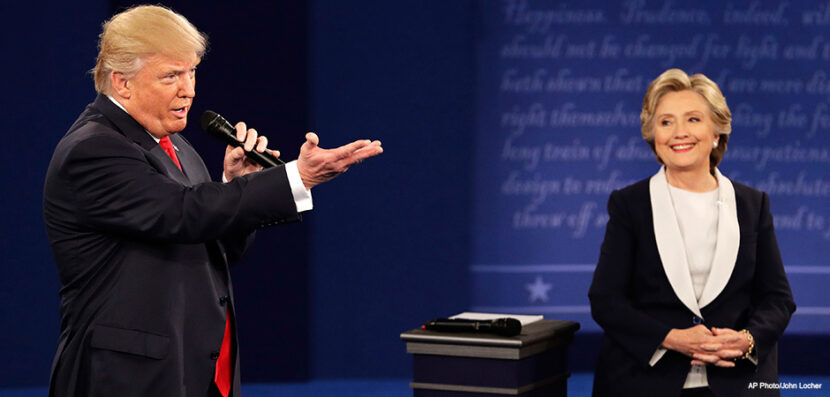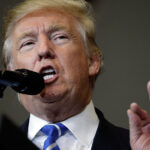- Current Events Nebraska Rejects Winner-Take-All Proposal
- Citizenship Voting Under Age 18
- Citizenship Citizenship in Action
- Democratic Party Biden’s and Trump’s Recent Primary Results
- Elections Trump and Biden Win South Carolina and Michigan Primaries
- Democratic Party Trump and Biden Win Big in Early February Contests

Examining the Second Presidential Debate
Democratic presidential candidate Hillary Clinton and Republican candidate Donald Trump met for the second time on Sunday evening at a debate at Washington University in St. Louis, Missouri. News anchors Anderson Cooper of CNN and Martha Raddatz of ABC served as co-moderators of the debate.
Debate Structure
Unlike the first debate–a more formal setting in which the candidates stood behind podiums and answered questions prepared in advance by a moderator–Sunday evening’s debate was in the more informal style of a town meeting. Both candidates were free to move around the stage and approach the audience if they wished. Half of the questions were posed directly by the audience, which was made up of undecided voters. The other half were posed by the moderators and reflected popular areas of interest based on social media and other sources. Each candidate had two minutes to answer questions, and sometimes the candidate who spoke first was allowed a quick follow-up response as well.
An Unprecedented Debate
Both Trump and Clinton spoke about several important domestic and foreign policy issues, such as the Affordable Health Care Act (Obamacare), clean energy, the tax code, and the declining situation in Syria. However, what set this debate apart was the amount of time spent on personal character attacks rather than on issues.
The candidates took the stage without shaking hands, even though a handshake is the traditional way to begin a debate. Secretary Clinton addressed a recently-released video recording of Mr. Trump making sexually aggressive comments about women, while Mr. Trump brought up several scandals involving former President Bill Clinton. The tense atmosphere culminated in Mr. Trump threatening to put Secretary Clinton in jail if he becomes president and she was (as he assumed she would be) convicted of the crimes he claims she has committed.
At the end of the debate, an audience member challenged each of the candidates to say something nice about the other one, which drew cheers and laughter from the crowd. Clinton complimented Trump’s children, while Trump praised Clinton for her strength and tenacity.
Winners and Losers
While most agree that Secretary Clinton won the first debate, the overall results of the second were less clear. This debate focused more on Clinton than on Trump, and she was often placed in the position of having to defend herself rather than promote her policy ideas. Trump, on the other hand, seemed more ready to go on the attack in this debate than he did for the first.
In general, both candidates did a good job rallying their supporters, but it is unclear whether or not either was able to win over many undecided voters. In a way, both candidates “lost” the debate, as they spent too much time on accusations, insults, and controversy, and therefore did not get a chance to speak as much as they should have about the issues that matter to Americans, such as the economy.
What’s Next?
The third and final presidential debate will be held on Wednesday, October 19, at 9:00pm ET. The format for the third debate will be the same as the first, in which the candidates will stand behind podiums and answer questions prepared in advance by a moderator. This will be the last chance that the two candidates have to face each other on the same stage before the November 8 election.


